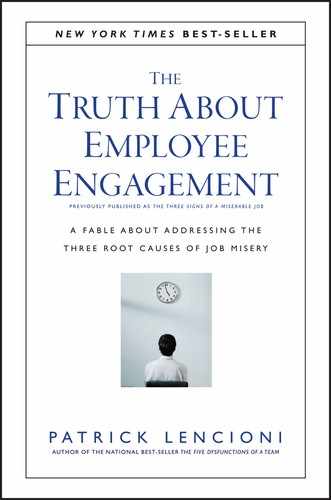Taking Action
So how can you go about putting all this into action? The answer depends on who you are.
If you're a manager . . .
Try taking three simple steps to make your employees less miserable and more engaged. The first of those is an honest self-assessment, asking a few obvious questions related to each of the three signs.
Anonymity: “Do I really know my people? Their interests? How they spend their spare time? Where they are in their lives?”
Irrelevance: “Do they know who their work impacts, and how?”
Immeasurement: “Do they know how to assess their own progress or success?”
Next, consider doing employee assessments, allowing people to provide information that will either confirm or deny the accuracy of the answers in each of the three areas.
Finally, develop a plan to shore up any inadequacies around the three causes of job misery. That could mean a series of simple one-on-one meetings, or even a team session like the one in the fable. And rather than being ambiguous or vague, which runs the risk of making employees suspect an ulterior motive, it's a good idea to just explain the three causes and what you are trying to do.
If you're an employee, job hunter, or recent college grad . . .
You can do some things to increase the odds that your job will be engaging. First, talk to your boss (or prospective boss) about the three root causes of job misery, and your desire to avoid them. Most people really do want to be good managers, and if they know that they can become good at relatively low cost, they'll often be willing to change their behavior.
But you can't be afraid to talk to them about it. “Hey, I just read a book about employee engagement, and I want to tell you about it. Not that you're a bad boss. It's just that I think I would do a better job and like working here even more if I were able to get a few things from you.”
Explain that you want them to know who you are and what your interests and aspirations are, how your job impacts someone else, and how you can better measure your success or progress. If your manager isn't interested in providing those things, you can smile nicely and say it's not a problem, and then go dust off your résumé and start looking for a nonmiserable job.
If you're in the process of looking for a great job, ask the hiring managers who interview you if they typically take an interest in employees, how the job they're discussing has an impact on people inside or outside the firm, and how you will be measured. If you're hearing answers that indicate anonymity, irrelevance, or immeasurement, know that the chances of job fulfillment are apt to be low.
If you're an executive, HR professional, or consultant and you're interested in establishing an organization-wide program around improving employee engagement . . .
Try a short, practical training session. This would involve teaching managers about the three causes, and then helping them put together plans for addressing them with their respective employees.
